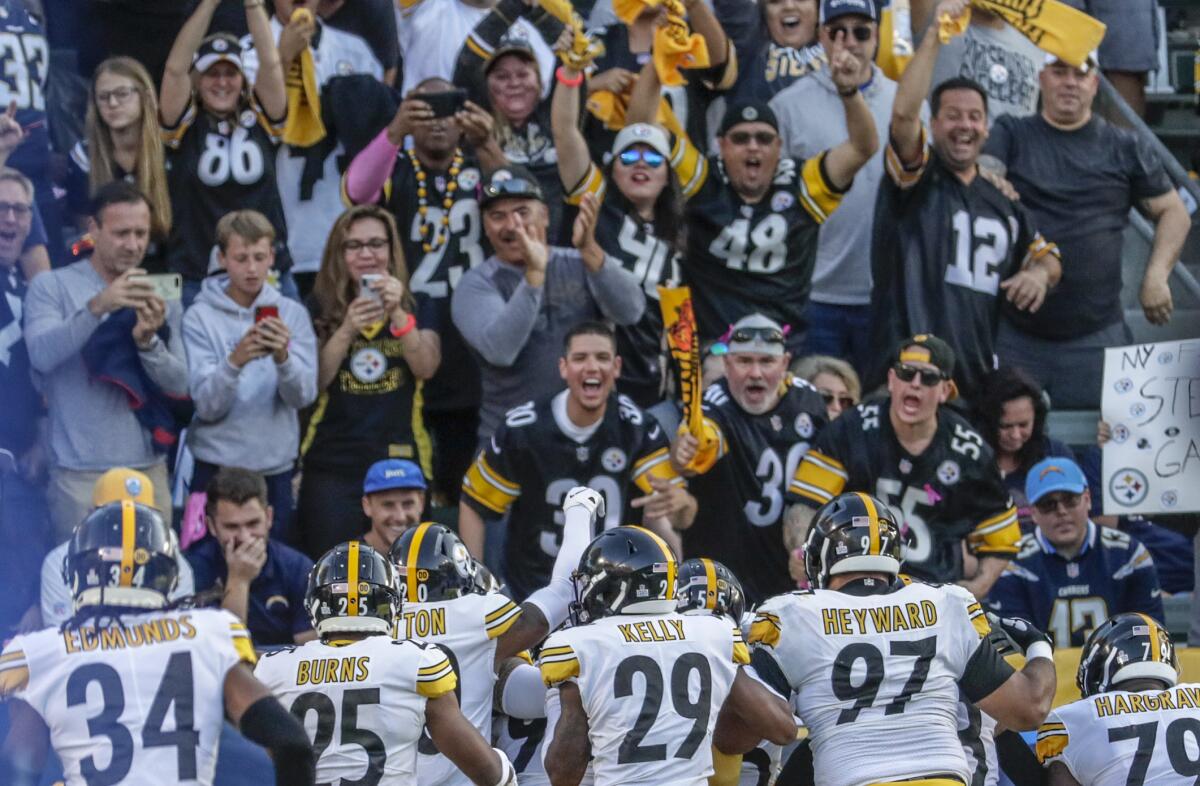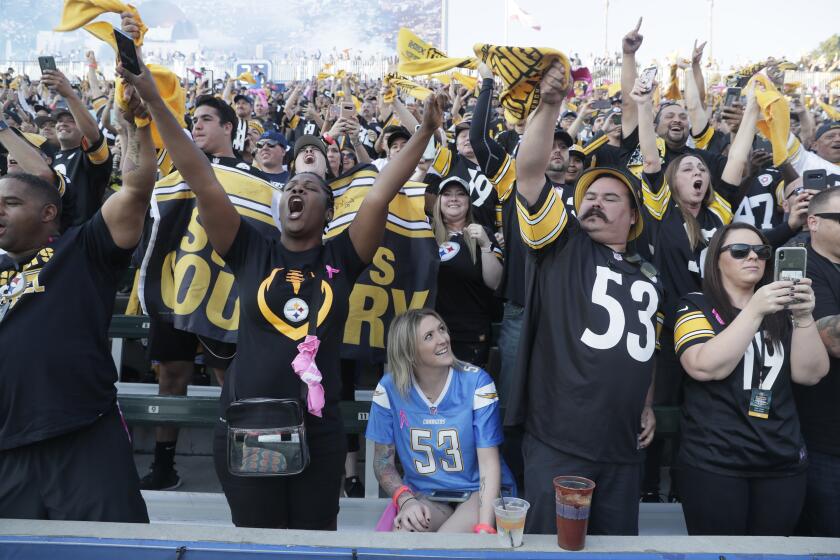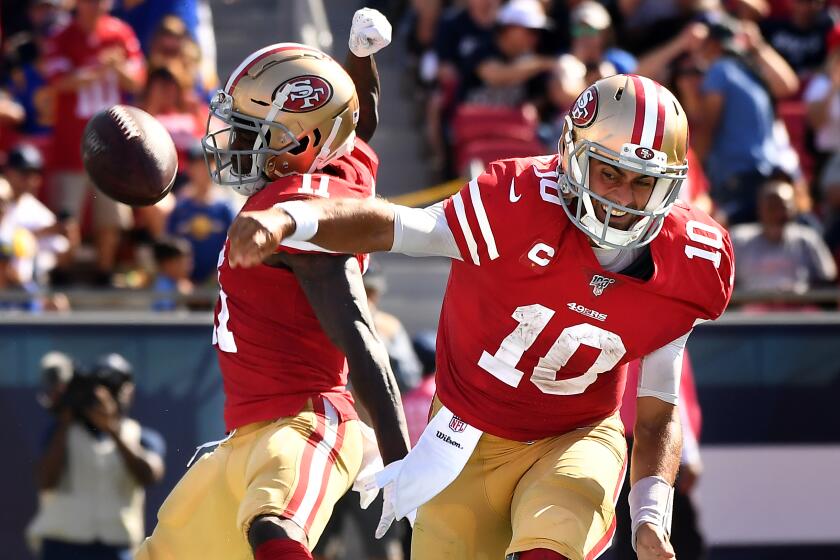Column: NFL’s failure to understand L.A. is hurting experience for Rams and Chargers fans

- Share via
The first time my name appeared in the Los Angeles Times was Oct. 17, 1997. I was a student at Notre Dame High School in Sherman Oaks, and Bill Plaschke had come to our fourth-period U.S. history class a couple days earlier to pick our brains for a column.
He wanted to know what it was like growing up in L.A. without an NFL team. The Raiders and Rams had played their final games in the L.A. area three years earlier when we were in grade school, and he asked us whether we missed the NFL.
We hadn’t.
Most of us were more interested in Shaquille O’Neal and the Lakers or Mike Piazza and the Dodgers than we were in yearning for teams that had left town when we were kids.
“Are you listening, NFL?” Plaschke wrote. “This is the sound of future ticket and merchandising dollars slipping away with every year you stay away. This is a generation that is being lost.”
The NFL didn’t listen. The league neglected a generation of fans before finally returning to Los Angeles in 2016 — 21 years after leaving — and it’s still paying the price for its absence.
The Styx song “Renegade,” an anthem for the Pittsburgh Steelers, was played as a joke. But some members of the home-standing Chargers didn’t find it so funny.
By the time the Rams moved back in 2016 and the Chargers moved here the following year, the generation they had lost had all grown up rooting for other teams in other cities or simply had no interest in the NFL.
We were fine. While the NFL was gone, the Lakers won five NBA championships, the Kings won two Stanley Cups, the Galaxy won five MLS Cups, the Sparks won back-to-back WNBA titles, the USC football team won a couple of national championships, the UCLA men’s basketball team played in three straight Final Fours, and the Clippers became a perennial playoff team. Fans in Anaheim celebrated the Angels winning their first World Series and the Ducks winning their first Stanley Cup. With the rise of fantasy football and the NFL RedZone channel, no one in L.A. was heartbroken about not having a real hometown team. Their fantasy football teams more than made up for it on Sundays.
The league didn’t do much to maintain a good relationship with the city after leaving town. It actually did everything in its power to fracture what was left of it with each passing year. During the 21 years L.A. was without a team, 22 new stadiums were built for 23 teams, many using the leverage of possibly relocating to Los Angeles to get public money to finance those stadiums. During that time, L.A. was nothing more than a pawn. We were shown enough artist renderings of failed NFL stadiums to fill the Los Angeles County Museum of Art.
From 1995 to 2015, the NFL staged 31 preseason and regular-season games around the globe in the hopes of cultivating interest in the league in cities such as London and Mexico City. Do you know how many games the league held in Los Angeles to cultivate interest in the country’s second-biggest market? Zero.

The end result is a home-field experience for the Rams and Chargers that still feels very much like an NFL international game in London or Mexico City. Walk around the tailgates at the Coliseum or Dignity Health Sports Park and you’ll see plenty of people wearing the opponent’s colors, but you’ll also see jerseys of random teams such as the Cowboys, Patriots, Raiders and other teams that aren’t playing anywhere near L.A. There are plenty of NFL fans in L.A., they just might not be fans of the teams that now claim the city as their home.
This past weekend marked the final time the Rams and Chargers play at home on the same Sunday. Next season, they will both move into the new $5 billion SoFi Stadium being built in Inglewood. Not only did both teams lose, dropping their combined record this season to 5-7 after combining to go 25-7 last season, but their fans were outnumbered at their home stadiums. It was closer to 50-50 for the Rams-49ers game and probably 90-10 in favor of Pittsburgh for the Steelers-Chargers game.
Both teams expected as much going into Sunday and project it will be just as bad for their next home games when the Rams face the Chicago Bears on Nov. 17 and the Chargers take on the Green Bay Packers on Nov. 3. The “get-in” price for Sunday’s 49ers-Rams game was $135, while the cheapest ticket for the Steelers-Chargers game was $250. The cheapest ticket for the Packers-Chargers game is $300.
After wins over sub-.500 Tampa Bay, Cincinnati, Pittsburgh and Cleveland, many wondered if unbeaten 49ers were for real, until their 20-7 win over Rams.
To put that into perspective, the Chargers are selling season tickets next year for as low as $50 per game. In other words, a Chargers fan could pay off their season tickets for next year in the new stadium by reselling just the Steelers and Packers games this season. It was a deal apparently too good to pass up for most Chargers season-ticket holders.
It’s a bad look, but it’s one the NFL created by looking the other way for more than two decades when it came to the Los Angeles market. It’s not an indictment on Los Angeles as an NFL city but rather an indictment on the NFL’s failure to understand Los Angeles.
Diehard fans who are going to pay hundreds of dollars for a ticket and thousands of dollars for a seat license aren’t created overnight. That type of loyalty and fandom is built over generations, and the NFL robbed this city of a team for an entire generation. It would be foolish for the league to think it could make up for that in a couple years.
It takes time, but if the NFL thinks it can fast-forward that process, it would simply be its latest miscalculation when it comes to understanding a city that has no problem treating the league the same way it was treated for years.
More to Read
Go beyond the scoreboard
Get the latest on L.A.'s teams in the daily Sports Report newsletter.
You may occasionally receive promotional content from the Los Angeles Times.









